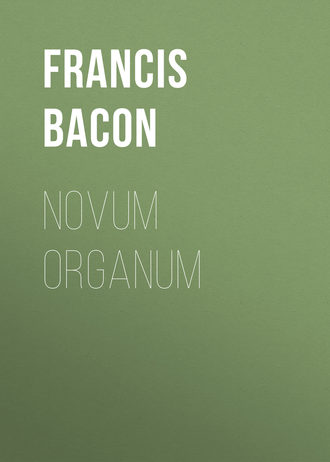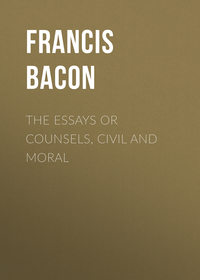
Novum Organum
9
It is argued by Hallam, with some appearance of truth, that idols is not the correct translation of εἴδωλα, from which the original idola is manifestly derived; but that Bacon used it in the literal sense attached to it by the Greeks, as a species of illusion, or false appearance, and not as a species of divinity before which the mind bows down. If Hallam be right, Bacon is saved from the odium of an analogy which his foreign commentators are not far wrong in denouncing as barbarous; but this service is rendered at the expense of the men who have attached an opposite meaning to the word, among whom are Brown, Playfair and Dugald Stewart. —Ed.
10
We cannot see how these idols have less to do with sophistical paralogisms than with natural philosophy. The process of scientific induction involves only the first elements of reasoning, and presents such a clear and tangible surface, as to allow no lurking-place for prejudice; while questions of politics and morals, to which the deductive method, or common logic, as Bacon calls it, is peculiarly applicable, are ever liable to be swayed or perverted by the prejudices he enumerates. After mathematics, physical science is the least amenable to the illusions of feeling; each portion having been already tested by experiment and observation, is fitted into its place in the system, with all the rigor of the geometrical method; affection or prejudice cannot, as in matters of taste, history or religion, select fragmentary pieces, and form a system of their own. The whole must be admitted, or the structure of authoritative reason razed to the ground. It is needless to say that the idols enumerated present only another interpretation of the substance of logical fallacies. —Ed.
11
The propensity to this illusion may be viewed in the spirit of system, or hasty generalization, which is still one of the chief obstacles in the path of modern science. —Ed.
12
Though Kepler had, when Bacon wrote this, already demonstrated his three great laws concerning the elliptical path of the planets, neither Bacon nor Descartes seems to have known or assented to his discoveries. Our author deemed the startling astronomical announcements of his time to be mere theoretic solutions of the phenomena of the heavens, not so perfect as those advanced by antiquity, but still deserving a praise for the ingenuity displayed in their contrivance. Bacon believed a hundred such systems might exist, and though true in their explanation of phenomena, yet might all more or less differ, according to the preconceived notions which their framers brought to the survey of the heavens. He even thought he might put in his claim to the notice of posterity for his astronomical ingenuity, and, as Ptolemy had labored by means of epicycles and eccentrics, and Kepler with ellipses, to explain the laws of planetary motion, Bacon thought the mystery would unfold itself quite as philosophically through spiral labyrinths and serpentine lines. What the details of his system were, we are left to conjecture, and that from a very meagre but naïve account of one of his inventions which he has left in his Miscellany MSS. —Ed.
13
Hinc elementum ignis cum orbe suo introductum est. Bacon saw in fire the mere result of a certain combination of action, and was consequently led to deny its elementary character. The ancient physicists attributed an orbit to each of the four elements, into which they resolved the universe, and supposed their spheres to involve each other. The orbit of the earth was in the centre, that of fire at the circumference. For Bacon’s inquisition into the nature of heat, and its complete failure, see the commencement of the second book of the Novum Organum. —Ed.
14
Robert Fludd is the theorist alluded to, who had supposed the gravity of the earth to be ten times heavier than water, that of water ten times heavier than air, and that of air ten times heavier than fire. —Ed.
15
Diagoras. The same allusion occurs in the second part of the Advancement of Learning, where Bacon treats of the idols of the mind.
16
A scholastic term, to signify the two eternities of past and future duration, that stretch out on both sides of the narrow isthmus (time) occupied by man. It must be remembered that Bacon lived before the doctrine of limits gave rise to the higher calculus, and therefore could have no conception of different denominations of infinities: on the other hand he would have thought the man insane who should have talked to him about lines infinitely great, inclosing angles infinitely little; that a right line, which is a right line so long as it is finite, by changing infinitely little its direction, becomes an infinite curve, and that a curve may become infinitely less than another curve; that there are infinite squares and infinite cubes, and infinites of infinites, all greater than one another, and the last but one of which is nothing in comparison with the last. Yet half a century sufficed from Bacon’s time, to make this nomenclature, which would have appeared to him the excess of frenzy, not only reasonable but necessary, to grasp the higher demonstrations of physical science. —Ed.
17
Spinoza, in his letter to Oldenberg (Op. Posth. p. 398), considers this aphorism based on a wrong conception of the origin of error, and, believing it to be fundamental, was led to reject Bacon’s method altogether. Spinoza refused to acknowledge in man any such thing as a will, and resolved all his volitions into particular acts, which he considered to be as fatally determined by a chain of physical causes as any effects in nature. —Ed.
18
Operatio spirituum in corporibus tangibilibus. Bacon distinguished with the schools the gross and tangible parts of bodies, from such as were volatile and intangible. These, in conformity with the scholastic language, he terms spirits, and frequently returns to their operations in the 2d book. —Ed.
19
Democritus, of Abdera, a disciple of Leucippus, born B.C. 470, died 360; all his works are destroyed. He is said to be the author of the doctrine of atoms: he denied the immortality of the soul, and first taught that the milky way was occasioned by a confused light from a multitude of stars. He may be considered as the parent of experimental philosophy, in the prosecution of which he was so ardent as to declare that he would prefer the discovery of one of the causes of natural phenomena, to the possession of the diadem of Persia. Democritus imposed on the blind credulity of his contemporaries, and, like Roger Bacon, astonished them by his inventions. —Ed.
20
The Latin is actus purus, another scholastic expression to denote the action of the substance, which composes the essence of the body apart from its accidental qualities. For an exposition of the various kinds of motions he contemplates, the reader may refer to the 48th aphorism of the 2d book. —Ed.
21
The scholastics after Aristotle distinguished in a subject three modes of beings: viz., the power or faculty, the act, and the habitude, or in other words that which is able to exist, what exists actually, and what continues to exist. Bacon means that is necessary to fix our attention not on that which can or ought to be, but on that which actually is; not on the right, but on the fact. —Ed.
22
The inference to be drawn from this is to suspect that kind of evidence which is most consonant to our inclinations, and not to admit any notion as real except we can base it firmly upon that kind of demonstration which is peculiar to the subject, not to our impression. Sometimes the mode of proof may be consonant to our inclinations, and to the subject at the same time, as in the case of Pythagoras, when he applied his beloved numbers to the solution of astronomical phenomena; or in that of Descartes, when he reasoned geometrically concerning the nature of the soul. Such examples cannot be censured with justice, inasmuch as the methods pursued were adapted to the end of the inquiry. The remark in the text can only apply to those philosophers who attempt to build up a moral or theological system by the instruments of induction alone, or who rush, with the geometrical axiom, and the à priori syllogism, to the investigation of nature. The means in such cases are totally inadequate to the object in view. —Ed.
23
Gilbert lived toward the close of the sixteenth century, and was court physician to both Elizabeth and James. In his work alluded to in the text he continually asserts the advantages of the experimental over the à priori method in physical inquiry, and succeeded when his censor failed in giving a practical example of the utility of his precepts. His “De Magnete” contains all the fundamental parts of the science, and these so perfectly treated, that we have nothing to add to them at the present day.
Gilbert adopted the Copernican system, and even spoke of the contrary theory as utterly absurd, grounding his argument on the vast velocities which such a supposition requires us to ascribe to the heavenly bodies. —Ed.
24
The Latin text adds “without end”; but Bacon is scarcely right in supposing that the descent from complex ideas and propositions to those of simple nature, involve the analyst in a series of continuous and interminable definitions. For in the gradual and analytical scale, there is a bar beyond which we cannot go, as there is a summit bounded by the limited variations of our conceptions. Logical definitions, to fulfil their conditions, or indeed to be of any avail, must be given in simpler terms than the object which is sought to be defined; now this, in the case of primordial notions and objects of sense, is impossible; therefore we are obliged to rest satisfied with the mere names of our perceptions. —Ed.
25
The ancients supposed the planets to describe an exact circle round the south. As observations increased and facts were disclosed, which were irreconcilable with this supposition, the earth was removed from the centre to some other point in the circle, and the planets were supposed to revolve in a smaller circle (epicycle) round an imaginary point, which in its turn described a circle of which the earth was the centre. In proportion as observation elicited fresh facts, contradictory to these representations, other epicycles and eccentrics were added, involving additional confusion. Though Kepler had swept away all these complicated theories in the preceding century, by the demonstration of his three laws, which established the elliptical course of the planets, Bacon regarded him and Copernicus in the same light as Ptolemy and Xenophanes. —Ed.
26
Empedocles, of Agrigentum, flourished 444 B.C. He was the disciple of Telanges the Pythagorean, and warmly adopted the doctrine of transmigration. He resolved the universe into the four ordinary elements, the principles of whose composition were life and happiness, or concord and amity, but whose decomposition brought forth death and evil, or discord and hatred. Heraclitus held matter to be indifferent to any peculiar form, but as it became rarer or more dense, it took the appearance of fire, air, earth and water. Fire, however, he believed to be the elementary principle out of which the others were evolved. This was also the belief of Lucretius. See book i. 783, etc.
27
It is thus the Vulcanists and Neptunians have framed their opposite theories in geology. Phrenology is a modern instance of hasty generalization. —Ed.
28
In Scripture everything which concerns the passing interests of the body is called dead; the only living knowledge having regard to the eternal interest of the soul. —Ed.
29
In mechanics and the general sciences, causes compound their effects, or in other words, it is generally possible to deduce à priori the consequence of introducing complex agencies into any experiment, by allowing for the effect of each of the simple causes which enter into their composition. In chemistry and physiology a contrary law holds; the causes which they embody generally uniting to form distinct substances, and to introduce unforeseen laws and combinations. The deductive method here is consequently inapplicable, and we are forced back upon experiment.
Bacon in the text is hardly consistent with himself, as he admits in the second book the doctrine, to which modern discovery points, of the reciprocal transmutation of the elements. What seemed poetic fiction in the theories of Pythagoras and Seneca, assumes the appearance of scientific fact in the hands of Baron Caynard. —Ed.
30
Galileo had recently adopted the notion that nature abhorred a vacuum for an axiomatic principle, and it was not till Torricelli, his disciple, had given practical proof of the utility of Bacon’s method, by the discovery of the barometer (1643) that this error, as also that expressed below, and believed by Bacon, concerning the homœopathic tendencies of bodies, was destroyed. —Ed.
31
Donec ad materiam potentialem et informem ventum fuerit. Nearly all the ancient philosophers admitted the existence of a certain primitive and shapeless matter as the substratum of things which the creative power had reduced to fixed proportions, and resolved into specific substances. The expression potential matter refers to that substance forming the basis of the Peripatetic system, which virtually contained all the forms that it was in the power of the efficient cause to draw out of it. —Ed.
32
An allusion to the humanity of the Sultans, who, in their earlier histories are represented as signalizing their accession to the throne by the destruction of their family, to remove the danger of rivalry and the terrors of civil war. —Ed.
33
The text is “in odium veterum sophistarum, Protagoræ, Hippiæ, et reliquorum.” Those were called sophists, who, ostentationis aut questus causa philosophabantur. (Acad. Prior. ii. 72.) They had corrupted and degraded philosophy before Socrates. Protagoras of Abdera (Ἄβδηρα), the most celebrated, taught that man is the measure of all things, by which he meant not only that all which can be known is known only as it related to our faculties, but also that apart from our faculties nothing can be known. The sceptics equally held that knowledge was probable only as it related to our faculties, but they stopped there, and did not, like the sophist, dogmatize about the unknown. The works of Protagoras were condemned for their impiety, and publicly burned by the ædiles of Athens, who appear to have discharged the office of common hangmen to the literary blasphemers of their day. —Ed.
34
Bacon is hardly correct in implying that the enumerationem per simplicem was the only light in which the ancients looked upon induction, as they appear to have regarded it as only one, and that the least important, of its species. Aristotle expressly considers induction in a perfect or dialectic sense, and in an imperfect or rhetorical sense. Thus if a genus (G), contains four species (A, B, C, D), the syllogism would lead us to infer, that what is true of G, is true of any one of the four. But perfect induction would reason, that what we can prove of A, B, C, D, separately, we may properly state as true of G, the whole genus. This is evidently a formal argument as demonstrative as the syllogism. In necessary matters, however, legitimate induction may claim a wider province, and infer of the whole genus what is only apparent in a part of the species. Such are those inductive inferences which concern the laws of nature, the immutability of forms, by which Bacon strove to erect his new system of philosophy. The Stagyrite, however, looked upon enumerationem per simplicem, without any regard to the nature of the matter, or to the completeness of the species, with as much reprehensive caution as Bacon, and guarded his readers against it as the source of innumerable errors. —Ed.
35
See Ax. lxi. toward the end. This subject extends to Ax. lxxviii.
36
Gorgias of Leontium went to Athens in 424 B.C. He and Polus were disciples of Empedocles, whom we have already noticed (Aphorism 63), where he sustained the three famous propositions, that nothing exists, that nothing can be known, and that it is out of the power of man to transmit or communicate intelligence. He is reckoned one of the earliest writers on the art of rhetoric, and for that reason, Plato called his elegant dialogue on that subject after his name.
37
Chrysippus, a stoic philosopher of Soli in Cilicia, Campestris, born in 280, died in the 143d Olympiad, 208 B.C. He was equally distinguished for natural abilities and industry, seldom suffering a day to elapse without writing 500 lines. He wrote several hundred volumes, of which three hundred were on logical subjects; but in all, borrowed largely from others. He was very fond of the sorites in argument, which is hence called by Persius the heap of Chrysippus. He was called the Column of the Portico, a name given to the Stoical School from Zeno, its founder, who had given his lessons under the portico.
Carneades, born about 215, died in 130. He attached himself to Chrysippus, and sustained with éclat the scepticism of the academy. The Athenians sent him with Critolaus and Diogenes as ambassador to Rome, where he attracted the attention of his new auditory by the subtilty of his reasoning, and the fluency and vehemence of his language. Before Galba and Cato the Censor, he harangued with great variety of thought and copiousness of diction in praise of justice. The next day, to establish his doctrine of the uncertainty of human knowledge, he undertook to refute all his arguments. He maintained with the New Academy, that the senses, the imagination, and the understanding frequently deceive us, and therefore cannot be infallible judges of truth, but that from the impressions produced on the mind by means of the senses, we infer appearances of truth or probabilities. Nevertheless, with respect to the conduct of life, Carneades held that probable opinions are a sufficient guide.
Xenophanes, a Greek philosopher, of Colophon, born in 556, the founder of the Eleatic school, which owes its fame principally to Parmenides. Wild in his opinions about astronomy, he supposed that the stars were extinguished every morning, and rekindled at night; that eclipses were occasioned by the temporary extinction of the sun, and that there were several suns for the convenience of the different climates of the earth. Yet this man held the chair of philosophy at Athens for seventy years.
Philolaus, a Pythagorean philosopher of Crotona, B.C. 374. He first supported the diurnal motion of the earth round its axis, and its annual motion round the sun. Cicero (Acad. iv. 39) has ascribed this opinion to the Syracusan philosopher Nicetas, and likewise to Plato. From this passage, it is most probable that Copernicus got the idea of the system he afterward established. Bacon, in the Advancement of Human Learning, charges Gilbert with restoring the doctrines of Philolaus, because he ventured to support the Copernican theory. —Ed.
38
Bacon is equally conspicuous for the use and abuse of analogical illustrations. The levity, as Stuart Mill very properly observes, by which substances float on a stream, and the levity which is synonymous with worthlessness, have nothing beside the name in common; and to show how little value there is in the figure, we need only change the word into buoyancy, to turn the semblance of Bacon’s argument against himself. —Ed.
39
We have before observed, that the New Academy did not profess skepticism, but the ἀκατάληψια, or incomprehensibility of the absolute essences of things. Even modern physicists are not wanting, to assert with this school that the utmost knowledge we can obtain is relative, and necessarily short of absolute certainty. It is not without an appearance of truth that these philosophers maintain that our ideas and perceptions do not express the nature of the things which they represent, but only the effects of the peculiar organs by which they are conveyed to the understanding, so that were these organs changed, we should have different conceptions of their nature. That constitution of air which is dark to man is luminous to bats and owls.
40
Owing to the universal prevalence of Aristotelism.
41
It must be remembered, that when Bacon wrote, algebra was in its infancy, and the doctrine of units and infinitesimals undiscovered.
42
Because the vulgar make up the overwhelming majority in such decisions, and generally allow their judgments to be swayed by passion or prejudice.
43
See end of Axiom lxi. The subject extends to Axiom xc.
44
If we adopt the statement of Herodotus, who places the Homeric era 400 years back from his time, Homer lived about 900 years before Christ. On adding this number to the sixteen centuries of the Christian era which had elapsed up to Bacon’s time, we get the twenty-five centuries he mentions. The Homeric epoch is the furthest point in antiquity from which Bacon could reckon with any degree of certainty. Hesiod, if he were not contemporary, immediately preceded him.
The epoch of Greek philosophy may be included between Thales and Plato, that is, from the 35th to the 88th Olympiad; that of the Roman, between Terence and Pliny. The modern revolution, in which Bacon is one of the central figures, took its rise from the time of Dante and Petrarch, who lived at the commencement of the fourteenth century; and to which, on account of the invention of printing, and the universal spread of literature, which has rendered a second destruction of learning impossible, it is difficult to foresee any other end than the extinction of the race of man. —Ed.
45
The allusion is evidently to Roger Bacon and Réné Descartes. —Ed.
46
From the abuse of the scholastics, who mistook the à priori method, the deductive syllogism, for the entire province of logic. —Ed.
47
See Aphorism xcv.
48
The incongruity to which Bacon alludes appears to spring from confounding two things, which are not only distinct, but affect human knowledge in inverse proportion, viz., the experience which terminates with life, with that experience which one century transmits to another. —Ed.
49
The Chinese characters resemble, in many respects, the hieroglyphics of the Egyptians, being adapted to represent ideas, not sounds.
50
See Axiom 75.
51
The methods by which Newton carried the rule and compass to the boundaries of creation is a sufficient comment on the sagacity of the text. The same cause which globulizes a bubble, has rounded the earth, and the same law which draws a stone to its surface, keeps the moon in her orbit. It was by calculating and ascertaining these principles upon substances entirely at his disposal that this great philosopher was enabled to give us a key to unlock the mysteries of the universe. —Ed.
52
See the “Clouds” of Aristophanes, where Socrates is represented as chasing Jupiter out of the sky, by resolving thunderstorms into aërial concussions and whirlwinds. —Ed.
53
Robespierre was the latest victim of this bigotry. In his younger days he attempted to introduce Franklin’s lightning conductor into France, but was persecuted by those whose lives he sought to protect, as one audaciously striving to avert the designs of Providence. —Ed.








